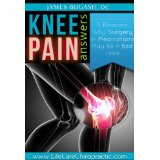
Weight plays large role in knee pain
Everyone who has torn cartilage in the knee seems to think surgery is the only option. This couldn’t be further from the truth.
I had addressed this topic some time ago in a prior blog article that can be read by clicking here. And, just in case you’d really like a lot more to read on the issue, you can download my Knee Pain Answers eBook by clicking here.
What you’ll find in the eBook is lots of research debunking common beliefs about knee pain. Which is good, because these beliefs are held by most everyone. Twice today I had to have the “knee conversation” with patients. Patients who have knee pain should just stay away from X-rays and MRIs (unless there has been significant trauma) unless they are hell-bent on having surgery already. Otherwise, the information we get from imaging may be misleading.
Why? Because on a knee MRI, upwards of 88% of people over 50 have “findings” AND NO PAIN! Society is so damn stuck on the idea that, if we see something on an X-ray or MRI, it has to be the cause of the pain. This is so far from true.
I’m not saying that osteoarthritis does not cause knee pain. Rather, before you make a decision about whether your knee pain is strictly from arthritis you need to find a physician that really understands the soft tissues of the knee and how to treat them correctly. In addition, there’s another important thing you’re going to have to do.
If you’re overweight, you’re going to have to work on losing weight.
I know, I know. Losing weight is the GOAL, not the process, and too many physicians leave it at that. Like people who are overweight don’t know that weight loss will help the knees?? We make sure that, if you are truly motivated to lose weight, we can facilitate the process of weight loss, either through our in-office weight loss program (also available remotely for those who do not live near the office) or with changes to your current lifestyle that are contributing to being overweight.
This particular study just drives home just how important weight loss can be for the knees. Researchers followed 250 adults with no knee arthritis for 2 years. MRIs were done before and after to evaluate what effect weight loss or gain had on the height of the cartilage and overall pain in the knees. Here’s what they found:
- 18% of the group had medial meniscal tears.
- In those with medial meniscal tears, for every 1% gain in weight, there was a 0.2% increased loss of cartilage volume and 11.6% increase in pain.
- In those with no medial meniscal tear, weight changes had no effect.
The cartilage volume changes were not all that great, but the changes in pain levels with even a very small weight change was quite dramatic. This may have to do with the fact that, as you lose weight through healthy lifestyle changes, your body will be less inflamed. Less inflammation means less pain.
Overall, though, it is clear that weight plays a very large role in knee pain. If you are serious about avoiding ANY type of knee surgery (and you should be…) than getting closer to an ideal body weight is high on the list of things you need to do.
